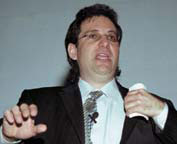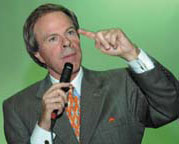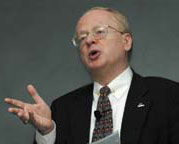| Q&A with UTA's oldest living graduate | Alumni as college presidents | Recognition of contributors |
 |
||
| Home Forethought Campus Buzz Feature Stories Re:Search The Score Alum News Yesteryear | ||
“Social engineering” is how Kevin Mitnick described hacking into computer files as he spoke at the Information Technology Security Conference in the University Center in September. Mitnick, one of the world’s most notorious hackers, served time in a federal prison for breaking into some of the United States’ most secure computer systems.
|
|
| Kevin Mitnick |
He explained that hackers contact people within the company whom they want to get information from and go from there. “Bad guys look for the weakest link in the chain,” he said during his speech on how to combat hacking. “Prime targets are people who have nothing to lose or are least likely to be affected.”
An attacker finds a name within the company, calls from outside and convinces someone on the phone that he is a company person and gets inside information.
“Social engineering is easier than hacking a system because there is nominal risk for an attacker and it is nearly 100 percent effective,” said Mitnick, author of The Art of Deception.
Checking vacation schedules is key for hackers, he said, and dumpster diving for information is another ploy. But the No. 1 target for “social engineers” is the help desk.
|
|
| Scott Murray |
Building credibility is the key to surviving in the media world, former KXAS Channel 5 Sports Director Scott Murray said at the 17th Anderson Sport Performance Lectures at the Lone Star Auditorium in October.
Murray encouraged students to “have fun, be first and be factual” in gathering the news. “Live, local, late-breaking news is wonderful,” he said, “but being correct is where you build trust.”
Murray, who worked at Channel 5 from 1980-2003, compared the strengths of radio, print and television. He gives TV the advantage in the five points of communication—sight, sound, color, motion and emotion—with TV having all five and the others only a couple each.
“Learning to communicate is an important part of the journalism field,” he explained. “Nowadays, people spend too much time using e-mail when they should be interacting on the phone or face to face.”
Murray is vice president of public affairs for PlainsCapital Corp., a Texas-based bank, mortgage and financial company. He also has his own television and video production company.
|
|
| Brian Hawkins |
Educause President Brian Hawkins emphasized that technology is a means of transformation, not the end result, during his presentation at UTA’s Fourth Annual Technology Fair in the University Center in November.
“Technology itself is wonderful. But focusing on the goals of the university is the real challenge,” Dr. Hawkins said. “The mix is different at every university. UT Arlington would have different needs from those of UT San Antonio or UT Austin.”
Hawkins warned that technology must be used wisely because once a new format is adopted, it’s almost impossible to go back. He also encouraged those in the audience to “celebrate the past.”
“Libraries are still a necessary form of archiving information, and we should utilize them. Someday we are going to have to find a better way to archive information on the Internet.”
Educause is a nonprofit association with offices in Boulder, Colo., and Washington, D.C., whose mission is to advance higher education by promoting the intelligent use of information technology.
— Jim Patterson
| Archives
| Alumni Association |
Giving to UTA | UTA
Home Copyright © 2005 UTA Magazine. All rights reserved. |


